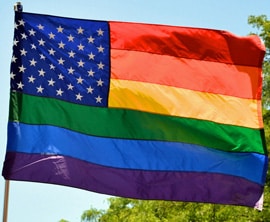
Photo by nathanmac87/flickr.com
Easy and careless cruelty
My best childhood friend told me he was gay when we were juniors in high school. It was after dark on a weekend and we were skulking around the University of New Mexico campus near the area everyone calls the duck pond. We acted like typical teenage boys, perfecting our use of filthy language and pretending to be older and cooler than we were.
He had said earlier that he needed to tell me something but it was taking him a while to come to the point. He was a smoker and I have a memory of his cigarette glowing red in the darkness while I waited for him to spit out whatever was on his mind.
The truth is that we’d grown apart some during high school. We didn’t spend every waking moment together as we’d done when we were younger. I was promoted to varsity football as a freshman while he always played junior varsity; I had been asked to leave my house and was living in an unpredictable situation whereas his parents remained stably married; and I was helping my serious girlfriend (who is now my wife) cope with her mother’s battle with cancer while he was trying (unbeknownst to me) to negotiate his sexuality.
Still, my friend and I made a point of keeping up with one another by getting together every now and then. This was one of those times.
Our parents taught at the same high school when we were children and we’d known one another since before we were in preschool. His father was a football coach and we’d hang out in the weight room watching the high school boys do their bench presses. They seemed unbelievably strong as they lifted the bars heavy with plates of weight off their chests. Over the years, eventually, as friends do, we shared many of our secrets. That night, after more than a decade of friendship, and much talking around what was really on his mind, my friend told me that he was gay.
When he came out, most people were not surprised. But I was. I figured he would have told me something like that as soon as he suspected it. But he didn’t tell me right away. In fact, I – his oldest friend – was one of the last people he told. This left me deeply saddened. I felt like I’d failed him. What did I care if he was attracted to men?

Nick Voges
“How long have you known?” I asked.
“Forever,” he replied.
“Why didn’t you tell me sooner?” I asked.
But even as I asked the question, I could easily recall the many times I’d said, with easy and careless cruelty, that something or someone was gay (or some more offensive version of the word). Of course, he had used that same language as well. We all did – our friends, our fathers, our coaches.
At that moment I was as deeply aware as I’ve ever been about the power of the words we use. I was heartbroken – and remain so in some ways – that I’d been a stumbling block to my best friend during a key leg in his journey toward being the man he wanted to be. What kind of person – much less friend – does that? Not the kind that I wanted to be. I wanted to have been better than that.
To be accurate, I was not nearly the worst offender. But I willingly participated in a larger system of injurious talk (we also loved to call people retarded, lame, SPED – and the list just gets worse from there), mostly ignorant of how damaging these names could be to a person. It is shameful behavior that I deeply regret. I probably should have known better – but I didn’t.
That’s why I applaud the NBA’s recent “Think B4 You Speak” public service announcements.
Think B4 you speak
Perhaps even more than watching the Dallas Mavericks beat the Los Angeles Lakers AND the Miami Heat on their way to winning the NBA championship this year, I appreciated the NBA addressing directly the prevalence of homophobic language in basketball, and sports in general.
It’s hard to forget the Tim Hardaway debacle from a few years ago, for example. And as recently as this year both Kobe Bryant and Joachim Noah invited intense public scrutiny upon themselves, and were dealt hefty fines from the league, for using anti-gay slurs during a basketball game.
Do I think that Kobe Bryant and Joachim Noah (or anyone who uses anti-gay slurs) hate gay people? I have no idea. I suspect most probably have gay friends (maybe even gay teammates or colleagues). Instead, I suspect they were just being – as many of us are – carelessly cruel. But that has to stop. Careless or not, cruelty is still cruelty.
Political correctness run amok?
In the “Think B4 You Speak” PSA, Phoenix Suns player Grant Hill says that “using gay to mean dumb or stupid (is) not cool… You’re better than that.” Still, some people I’ve talked to about the PSA think it’s just another example of political correctness run amok.
But I disagree. As the recent spate of suicides resulting from bullying indicates, there’s nothing funny or harmless about anti-gay slurs. Besides, what’s so troubling or difficult about calling someone by the name they prefer? Is it so important that we be funny or cool or tough (or whatever) that we hinder the people around us from feeling safe in their communities? We’re better than that.
What can we do to make it better for one another?
I’ve written extensively abut this in a previous post, so I’ll only restate the key best practices for making gay people feel safe and welcome that emerged from the wide-reaching and comprehensive report entitled the 2010 State of Higher Education for Lesbian, Gay, Bisexual, and Transgender People.
- Develop inclusive policies. In other words, we need to explicitly welcome LGBTQQ people into our communities.
- Demonstrate institutional commitment. We should, in our workplaces and social groups, integrate LGBTQQ concerns into our practices. Here’s what the study says:
Even the simplest steps, such as creating inclusive wording on documents, creates brave space in which LGBTQQ individuals are free to be themselves. Due to the high rate of harassment/discrimination experienced by people who do not fit the socially constructed categories of sexual identity, gender identity, and gender expression, procedures that directly respond to acts of intolerance are especially needed.
- Respond appropriately to anti-LGBTQQ incidents/bias. Don’t put up with it. Defend your friends and your loved ones. When you hear something hurtful, ask the speaker what they mean and why they feel the way they do. Let them know that you don’t agree and that you won’t participate. Prepare yourself now to do the right thing.
Is progress being made?
I think so. Just last month I joined many of my friends in celebrating the recent decision by the New York State Senate to make marriages gender neutral. This is a big step forward on one of the most important civil rights issues of our time, in one of the most important states in the United States.
And locally we’ve seen progress as well. For example, the Las Cruces City Council recently issued a proclamation naming June 2011 as Las Cruces Gay Pride Month. This is a good example of city leaders exhibiting the first two best practices listed above: developing inclusive policies and demonstrating institutional commitment to civil rights.
Yet, my optimism is tempered when people like President Obama say that his views regarding the civil rights of any American citizens must “evolve.” Pretty disappointing. Clearly there is still work to do.
We’re better than that
I wish this NBA PSA had been around when I was young and talking in a way that was a stumbling block to my best friend’s happiness. Not just for him, but for me, too. It’s certainly possible that I would have just laughed the PSA off, dismissing it so that I wouldn’t have to change my bad behavior, or confront bad behavior when I saw it from my friends. Still, I would have had to think about the meaning and effect of the words I used, and to live with my decision to be consciously cruel rather than merely carelessly so. I’d have to decide whether or not to be better.
This is the decision we all face everyday in a million tiny moments: Will we stand up for what we believe in? Will we stand up for one another? Will we help our friends and neighbors find happiness? Will we be better?
Good work, NBA – and go Mavs!
Nick Voges is the blogger behind NMPolitics.net’s Zeitgeist. E-mail him at nick@nmpolitics.net.
